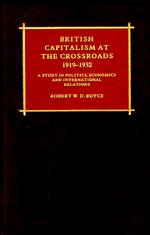 British Capitalism at the Crossroads, 1919–1932
British Capitalism at the Crossroads, 1919–1932 Book contents
- Frontmatter
- Contents
- Preface
- List of abbreviations
- Introduction
- 1 THE POLITICS OF ECONOMIC INTERNATIONALISM
- 2 CRUCIFIED ON A CROSS OF GOLD
- 3 ‘NORMALCY’
- 4 CONFLICT OVER COMMERCE
- 5 THE SCRAMBLE FOR GOLD
- 6 THE SECOND LABOUR GOVERNMENT AT THE HAGUE
- 7 FREE TRADE: THE LAST OFFENSIVE
- 8 THE CHALLENGE OF REGIONALISM
- 9 THE GOLD STANDARD UNDERMINED
- 10 THE AUSTRO-GERMAN CUSTOMS UNION CRISIS
- 11 THE COLLAPSE OF ECONOMIC INTERNATIONALISM
- Conclusion
- Notes
- Bibliography
- Index
7 - FREE TRADE: THE LAST OFFENSIVE
Published online by Cambridge University Press: 05 November 2011
- Frontmatter
- Contents
- Preface
- List of abbreviations
- Introduction
- 1 THE POLITICS OF ECONOMIC INTERNATIONALISM
- 2 CRUCIFIED ON A CROSS OF GOLD
- 3 ‘NORMALCY’
- 4 CONFLICT OVER COMMERCE
- 5 THE SCRAMBLE FOR GOLD
- 6 THE SECOND LABOUR GOVERNMENT AT THE HAGUE
- 7 FREE TRADE: THE LAST OFFENSIVE
- 8 THE CHALLENGE OF REGIONALISM
- 9 THE GOLD STANDARD UNDERMINED
- 10 THE AUSTRO-GERMAN CUSTOMS UNION CRISIS
- 11 THE COLLAPSE OF ECONOMIC INTERNATIONALISM
- Conclusion
- Notes
- Bibliography
- Index
Summary
Labour's search for an international strategy
Arthur Henderson, speaking to reporters at The Hague on 31 August 1929, stated that the conference just ended had ‘opened up a new era. For the first time since August 1914 it can be said that the war era is really ended.’
Henderson's elation was understandable if not altogether warranted. The Hague conference had concluded successfully after more than three weeks of bitter confrontation over Snowden's demands. An ostensibly final reparation settlement had been adopted. Germany was freed of the humiliating controls on her economy that had been part of the Dawes Plan. More important, the departure of Allied troops from the Rhineland would be advanced from 1935 to the spring of 1930. At the Tenth Assembly of the League of Nations, about to open in Geneva, Henderson planned to sign the Optional Clause committing Britain to accept arbitration in all justiciable disputes, a step he hoped other powers would follow, bringing nearer the day when international conflict would be restricted to the submission of contending legal briefs to the Permanent Court of International Justice. Negotiations with the United States on a naval arms limitation agreement had progressed to the point where MacDonald would soon visit Washington for talks with President Hoover. Within three months of taking office the Labour government had gone some way towards realising its foreign policy objectives, and demonstrating that, as MacDonald had promised, it ‘knew how to govern’.
- Type
- Chapter
- Information
- British Capitalism at the Crossroads, 1919–1932A Study in Politics, Economics, and International Relations, pp. 217 - 240Publisher: Cambridge University PressPrint publication year: 1988


